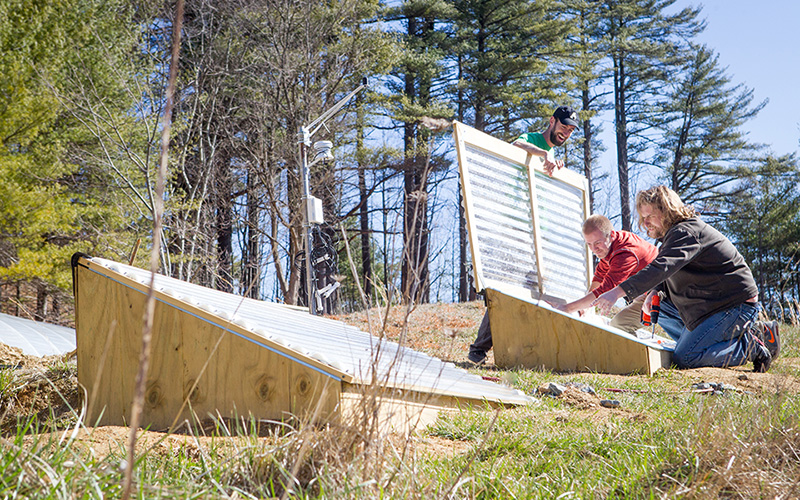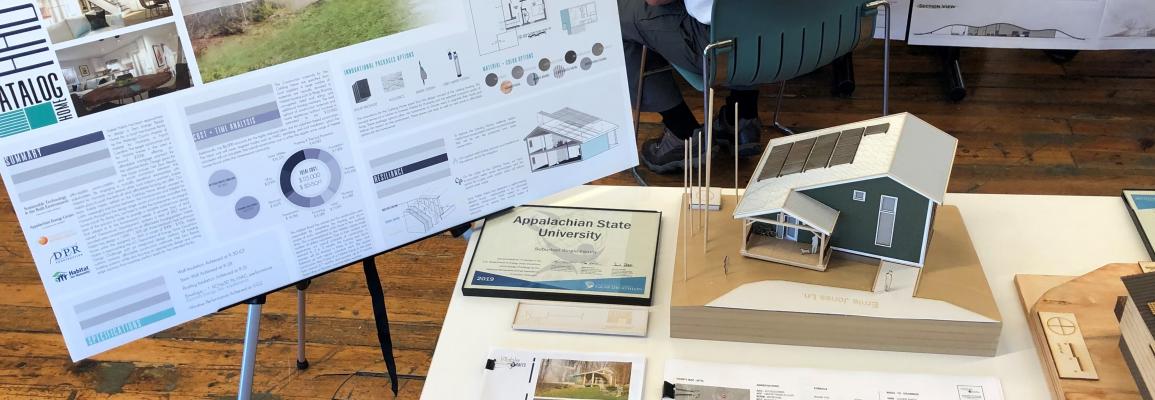Outreach
The Energy Extension Program (EEP) is a collaborative effort of the Appalachian Energy Center, the Department of Sustainable Technology and the Built Environment (STBE), and the Office of Sustainability. We are motivated by a common goal of increasing our capacity to consistently and effectively respond to requests for help on energy topics from local residents, business owners and community organizations. Please provide feedback as the program evolves and consider supporting EEP!
Mission
The mission of the Appalachian Energy Center’s Energy Extension Program (EEP) is to provide a hub for energy research, education and action that connects University expertise with community need. The program consists of an online resource center and mechanisms to connect the community to student research and learning opportunities.

Energy extension services
Appalachian State University’s Sustainable Technology and Building Science academic programs provide an opportunity to leverage student learning for community benefit on these topics. At this time, we are able to offer residential energy assessments and residential renewable energy site assessments when course schedules allow. We strive to provide you with valuable information throughout the process, but please keep in mind that the primary objective is educational. At this time, EEP services are only available to App State faculty, staff and students. If you are not eligible but are interested in these services in the future, please let us know by completing our feedback form.
The steps below are roughly what you might expect during this process. Due to limited resources, we can only offer a few of each service per academic term. Completing the request form does not guarantee services will be completed.
- Self-Educate – Please learn what you can about the energy-related topic(s) that interest you, such as our Affordable Passive Solar Planbook. If you cannot find a resource you think you need, please complete our feedback form to let us know.
- Request Services – Complete the energy extension services intake form. After receiving this form, we will likely contact you for more information. If at any time, you elect not to proceed, please let us know so that we can offer the opportunity to someone else.
- Agreement and Documentation – The University requires an executed service agreement before we are able to provide services. We also charge a $40 service fee to defray program costs (via cash or check made to Appalachian State University). You may request a fee waiver by contacting James Sharp at sharpj1@appstate.edu or 828-262-8913. View and print the agreement.
- Virtual Assessment or On-site Services – Recent advances in technology now allow us to conduct a virtual assessment of solar potential. An energy efficiency assessment requires on-site activities. We will schedule an initial site visit to prepare for the actual assessment. Occupant and/or owner should be present for the duration of the visit. Details and duration depend on the service(s) performed.
- Report and Recommendations – Following some analysis of the information and data collected, we will provide you with a report that includes recommendations. This report is generated in the course of providing an educational experience for our students and is for informational purposes only.
- Feedback and Impact – Please give us feedback and complete any follow up surveys or questionnaires that we send. Your responses will help us improve this program and understand its impact. Research opportunities might emerge via these interactions, and we would greatly appreciate your participation as those arise.
If you have questions, please contact James Sharp at sharpj1@appstate.edu or 828-262-8913.

Project and research opportunities
The project and research opportunities part of the Energy Extension Program exists to connect community need of this type with appropriate faculty and students.
Most App State students engage in a research project of some sort during their time as a student. The academic programs related to clean energy are especially project- and research-intensive. The stories and case studies below are examples of projects that have been completed in the past. Following your own research and, if appropriate, the results of energy extension services, please complete the form below to share your need.
Glossaries of energy terms
Please use the glossaries below to look up terms. We acknowledge and appreciate the work of the US Department of Energy, the American Council for an Energy-Efficient Economy, the GreenBuilt Alliance and the US Energy Information Administration to provide the comprehensive glossaries linked below.